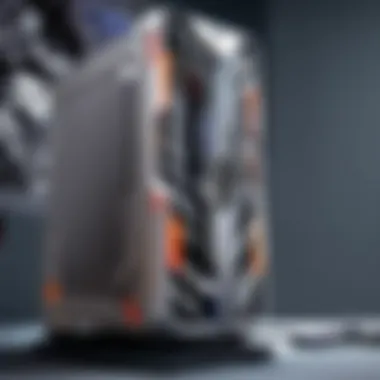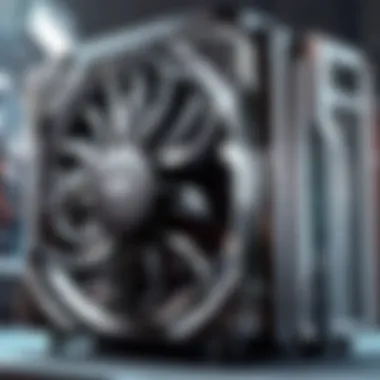A Comprehensive Guide to Optimizing PC Requirements for Gaming


Game Overview
When delving into the world of PC gaming, optimizing your system's requirements is paramount. As a gamer, ensuring that your PC setup meets the necessary standards can significantly impact your gaming experience. This comprehensive guide aims to assist both casual and competitive players in fine-tuning their hardware and software components to elevate their gaming performance and enjoyment.
Hardware Optimization
The first step in enhancing your PC for gaming is understanding the importance of hardware components. From the processor to the graphics card, each piece plays a crucial role in determining your system's capability to handle games seamlessly. Upgrading to a faster processor, installing additional RAM, and investing in a high-performance GPU can greatly enhance your gaming experience.
Processor
The processor, also known as the CPU, serves as the brain of your computer. A powerful processor with multiple cores can improve game loading times, graphics rendering, and overall system performance. When selecting a processor for gaming, consider factors such as clock speed, core count, and cache size to ensure optimal gameplay.
Graphics Card
The graphics card, or GPU, is responsible for rendering images and graphics in games. A high-quality GPU with ample VRAM can enhance visual fidelity, frame rates, and overall gameplay smoothness. Upgrading to a modern graphics card with advanced features like ray tracing and DLSS can provide a more immersive gaming experience.
Software Enhancements
In addition to hardware upgrades, optimizing your PC for gaming also involves tweaking software settings for maximum performance. Adjusting in-game graphics settings, updating drivers, and optimizing system resources are crucial steps in ensuring a smooth gaming experience. Utilizing software tools like MSI Afterburner for GPU monitoring and optimization can further boost your system's gaming capabilities.
Graphics Settings
Fine-tuning graphics settings in games can drastically impact performance and visual quality. Adjusting parameters such as resolution, texture quality, anti-aliasing, and shadow detail can help achieve the perfect balance between visual appeal and smooth gameplay. Experimenting with different settings and monitoring FPS can help optimize your gaming experience.
Driver Updates
Keeping graphics card drivers up to date is essential for compatibility, performance, and stability. Regularly checking for driver updates from manufacturers like NVIDIA and AMD can ensure that your system is equipped with the latest optimizations and fixes for gaming. Updating other system drivers, such as audio and network drivers, can also prevent potential issues during gameplay.
Conclusion


Optimizing PC requirements for gaming is a continuous process that entails a combination of hardware upgrades and software tweaks. By understanding the importance of hardware components, fine-tuning software settings, and staying updated on gaming advancements, players can create an optimal gaming setup that maximizes performance and enjoyment. Whether you're a casual gamer or a competitive player, investing time and effort into optimizing your PC can lead to a more immersive and satisfying gaming experience.
Understanding PC Requirements for Gaming
In this detailed guide on optimizing PC requirements for gaming, we delve into the critical aspects that are essential for enhancing gaming experiences to ensure maximum performance. Understanding PC requirements holds immense significance in the realm of gaming as it acts as the foundation upon which the entire gaming setup is built. By comprehending the intricacies of PC specifications, gamers can make informed decisions that directly impact gameplay. This section will explore the pivotal role that PC specifications play in determining the overall quality of gaming experiences.
Importance of PC Specifications
Impact on Gaming Performance:
When it comes to the impact on gaming performance, the specifications of a PC are crucial factors determining how smoothly and seamlessly a game runs. The quality of components, such as the graphics card, processor, memory, and storage, directly influences the frame rates, visual fidelity, and overall responsiveness of games. Investing in high-quality PC specifications can lead to a significant improvement in gaming performance and overall gameplay experience. Gamers aiming for an immersive and lag-free gaming session often prioritize upgrading their PC specifications to meet the requirements of modern and demanding games.
Compatibility with Game Demands:
Another crucial aspect of PC specifications is their compatibility with game demands. Different games have varying requirements in terms of hardware specifications, and ensuring that your PC aligns with these demands is essential for optimal gameplay. Compatibility issues can lead to performance bottlenecks, game crashes, and overall dissatisfaction with the gaming experience. By understanding the compatibility of PC specifications with specific game demands, gamers can tailor their setup to deliver the best possible performance for the games they intend to play.
Key Hardware Components
Graphics Card:
The graphics card is a fundamental component of any gaming PC, responsible for rendering images and displaying them on the monitor. A high-quality graphics card can significantly enhance visual quality, offering smooth frame rates and detailed graphics in games. Gamers often look for graphics cards with advanced features like ray tracing and high VRAM capacity to elevate their gaming experience to the next level.
Processor (CPU):
The processor, also known as the CPU, serves as the brain of the computer, handling calculations and executing instructions for various tasks, including gaming. A powerful CPU can improve overall system responsiveness and help in running games more efficiently, especially CPU-intensive titles. Gamers interested in seamless multitasking and fast game load times opt for processors with higher core counts and clock speeds.
Memory (RAM):
RAM, or random-access memory, plays a vital role in storing temporary data that the CPU needs quick access to while running programs, including games. Sufficient RAM capacity ensures smooth gameplay by reducing loading times and minimizing lags. Gamers often prioritize higher RAM capacities and faster frequencies to handle memory-intensive games without performance hiccups.


Storage (SSD vs. HDD):
The choice between solid-state drives (SSD) and hard disk drives (HDD) for storage impacts gaming performance in terms of loading times and data access speeds. SSDs offer significantly faster read and write speeds compared to HDDs, resulting in snappier system boot times and quicker game loading screens. While SSDs provide speed benefits, HDDs offer larger storage capacities at a more affordable price point, making them suitable for storing game libraries or media files with less need for rapid access.
Determining PC Requirements for Specific Games
In the realm of gaming, understanding the unique requirements of specific games is paramount. A critical aspect of this comprehensive guide on optimizing PC requirements for gaming is the section dedicated to Determining PC Requirements for Specific Games. By delving into the intricacies of game-specific demands, players can ensure their systems are finely tuned to deliver optimal performance. Whether tackling graphically intensive titles or indie gems, analyzing the prerequisites of each game aids in creating a tailored gaming experience that maximizes enjoyment.
Researching Game Specifications
Minimum vs. Recommended Requirements:
An essential consideration when exploring game specifications is the differentiation between Minimum and Recommended Requirements. The Minimum Requirements outline the basic components necessary to run a game, ensuring it can be launched and played at a foundational level. On the other hand, Recommended Requirements represent the hardware needed to experience the game at its best, with enhanced graphics and smooth gameplay. This dichotomy empowers players to assess their system capabilities accurately, making informed decisions on performance levels and visual fidelity before diving into a new gaming venture.
Resource-Intensive Game Titles:
Resource-Intensive Game Titles present a unique challenge and opportunity for gamers seeking cutting-edge experiences. These titles push the boundaries of hardware capabilities, demanding top-tier components to deliver immersive gameplay. While requiring advanced graphics cards and robust processors, these games offer unparalleled visual quality and realism, enticing players into stunning virtual worlds. Balancing the allure of top-tier graphics with the necessary investment in hardware becomes a pivotal decision point for gaming enthusiasts venturing into resource-intensive titles.
Benchmarking Tools for Performance Evaluation
3DMark:
A cornerstone of performance evaluation in the gaming community, 3DMark stands out as a premier tool for benchmarking hardware capabilities. By stress-testing graphic cards and processors through intricate simulations, 3DMark provides users with detailed insights into their system's performance under varying loads. This tool aids in identifying bottlenecks, optimizing settings, and gauging the potential for system upgrades, serving as a compass for gamers navigating the complex landscape of PC gaming hardware.
UserBenchmark:
UserBenchmark emerges as a valuable resource for gamers seeking in-depth analyses of their system's performance across multiple facets. This tool benchmarks not only graphical prowess but also evaluates CPU, memory, and storage speeds, offering a comprehensive overview of a system's strengths and weaknesses. Through intuitive comparisons and detailed breakdowns, UserBenchmark empowers users to make informed decisions on hardware upgrades, ensuring their gaming rig evolves in tandem with the ever-changing demands of modern game titles.
Building a Gaming PC


Building a Gaming PC holds a pivotal role in this comprehensive guide on optimizing PC requirements for gaming. In the realm of gaming, the choice between a custom-built system and a pre-built one significantly impacts the overall gaming experience. Custom-built systems offer gamers the freedom to select each component according to their preferences and requirements. This customization allows for a tailored gaming rig that can deliver optimal performance based on individual needs and budget constraints. On the other hand, pre-built systems are convenient options for gamers who prioritize ease of setup and are looking for a ready-to-use solution. These systems come pre-configured with components that are cohesive and often ensure compatibility and stability right out of the box. However, they may lack the flexibility of customization found in custom-built systems. Deciding between custom and pre-built systems ultimately revolves around the user's preferences, technical expertise, and budget allocation.
Custom vs. Pre-Built Systems
Advantages and Considerations
Exploring the advantages and considerations of custom vs. pre-built systems sheds light on the unique features and benefits each option offers. Custom-built systems present the advantage of full control over component selection, enabling users to cherry-pick hardware that aligns with their specific gaming needs. This flexibility allows for greater performance optimization and future upgrades as technology advances. However, this route requires technical knowledge or research to ensure compatibility and proper assembly. On the other hand, pre-built systems provide convenience and simplicity, ideal for users with limited technical expertise or time constraints. These systems are designed by professionals, offering a streamlined setup process and technical support if needed. Yet, pre-built systems may limit customization options and could potentially be more expensive compared to building a custom rig from scratch. Understanding the advantages and considerations of both custom and pre-built systems is essential in tailoring a gaming setup according to individual preferences, performance requirements, and budget considerations.
Budget-Friendly Components
Value for Performance
Delving into budget-friendly components unveils the importance of striking a balance between cost and performance in the pursuit of an optimized gaming PC. When considering value for performance, gamers aim to maximize the efficiency of components while staying within budget constraints. Budget-friendly components offer cost-effective solutions without compromising on essential features or performance benchmarks. These components provide a strategic approach to building or upgrading a gaming system by prioritizing key aspects such as processing power, graphics capabilities, and storage efficiency. Selecting budget-friendly components involves thorough research to identify reliable brands and models that offer competitive performance at reasonable prices. While cost may be a significant determining factor, value for performance emphasizes the importance of efficiency, reliability, and longevity in enhancing the overall gaming experience. By strategically selecting budget-friendly components, gamers can optimize their setups to meet gaming demands while maximizing cost-effectiveness and performance capabilities.
Maintaining and Upgrading PC Hardware
In the realm of optimizing PC requirements for gaming, the topic of maintaining and upgrading PC hardware emerges as a critical cornerstone. A well-maintained and regularly upgraded system not only ensures optimal performance but also prolongs the lifespan of your gaming rig. As games become more demanding and hardware evolves, keeping your PC hardware in top condition becomes paramount to stay competitive in the gaming arena. This section will explore the specific elements, benefits, and considerations associated with maintaining and upgrading PC hardware to empower gamers in their quest for an enhanced gaming experience.
Cleaning and Cooling Techniques
Airflow Optimization
Airflow optimization plays a pivotal role in maintaining the thermal balance within your PC setup. By strategically configuring airflow patterns and utilizing efficient cooling mechanisms, gamers can prevent overheating and safeguard critical components from thermal damage. The key characteristic of airflow optimization lies in its ability to promote steady air circulation, dissipating heat generated during intense gaming sessions effectively. This proactive approach to cooling is a popular choice among gamers seeking to enhance system stability and reliability. Additionally, the unique feature of airflow optimization lies in its capacity to maintain optimal operating temperatures, thereby boosting overall performance. While airflow optimization offers numerous advantages, such as improved component longevity and enhanced system efficiency, it requires careful planning and monitoring to maximize its benefits for your gaming setup.
Dust Management
Dust management represents another crucial aspect of PC maintenance, particularly in combating the accumulation of dust and debris within your system. Efficient dust management practices involve regular cleaning of internal components and utilization of dust filters to mitigate the risk of overheating and hardware malfunctions. The key characteristic of dust management involves minimizing dust buildup to uphold system integrity and prevent performance degradation. This preventative measure is a popular choice among gamers aiming to preserve their hardware investment and ensure uninterrupted gameplay. The unique feature of dust management lies in its capacity to maintain a clean and dust-free environment within your PC, reducing the risk of component failure and prolonging the hardware's lifespan. While dust management offers significant benefits, including improved system reliability and reduced maintenance costs, adherence to regular cleaning schedules is essential to harness its full potential.
Upgrade Considerations
Upgrade considerations play a pivotal role in optimizing PC requirements for gaming by ensuring your system remains relevant in the face of advancing technologies and game requirements. By implementing future-proofing strategies, gamers can enhance their gaming experience and adapt to upcoming challenges without the need for frequent hardware replacements. This section will delve into the specific aspect of future-proofing strategies, examining its key characteristics, advantages, and considerations within the context of optimizing PC requirements for gaming.
Future-Proofing Strategies
Future-proofing strategies encompass a proactive approach to hardware upgrades aimed at preemptively addressing emerging technologies and performance demands. By selecting components with long-term compatibility and upgradability, gamers can extend the longevity of their system and minimize the need for frequent overhauls. The key characteristic of future-proofing strategies lies in their ability to balance current performance needs with future scalability, ensuring a sustainable investment in gaming hardware. This forward-looking approach is a popular choice among gamers looking to optimize their PC requirements without falling behind technological advancements. The unique feature of future-proofing strategies is their capacity to anticipate and accommodate future hardware developments, providing gamers with a competitive edge in the ever-evolving gaming landscape. While future-proofing strategies offer significant advantages, such as cost-efficiency and long-term viability, careful research and planning are necessary to align upgrades with future gaming trends and requirements.



